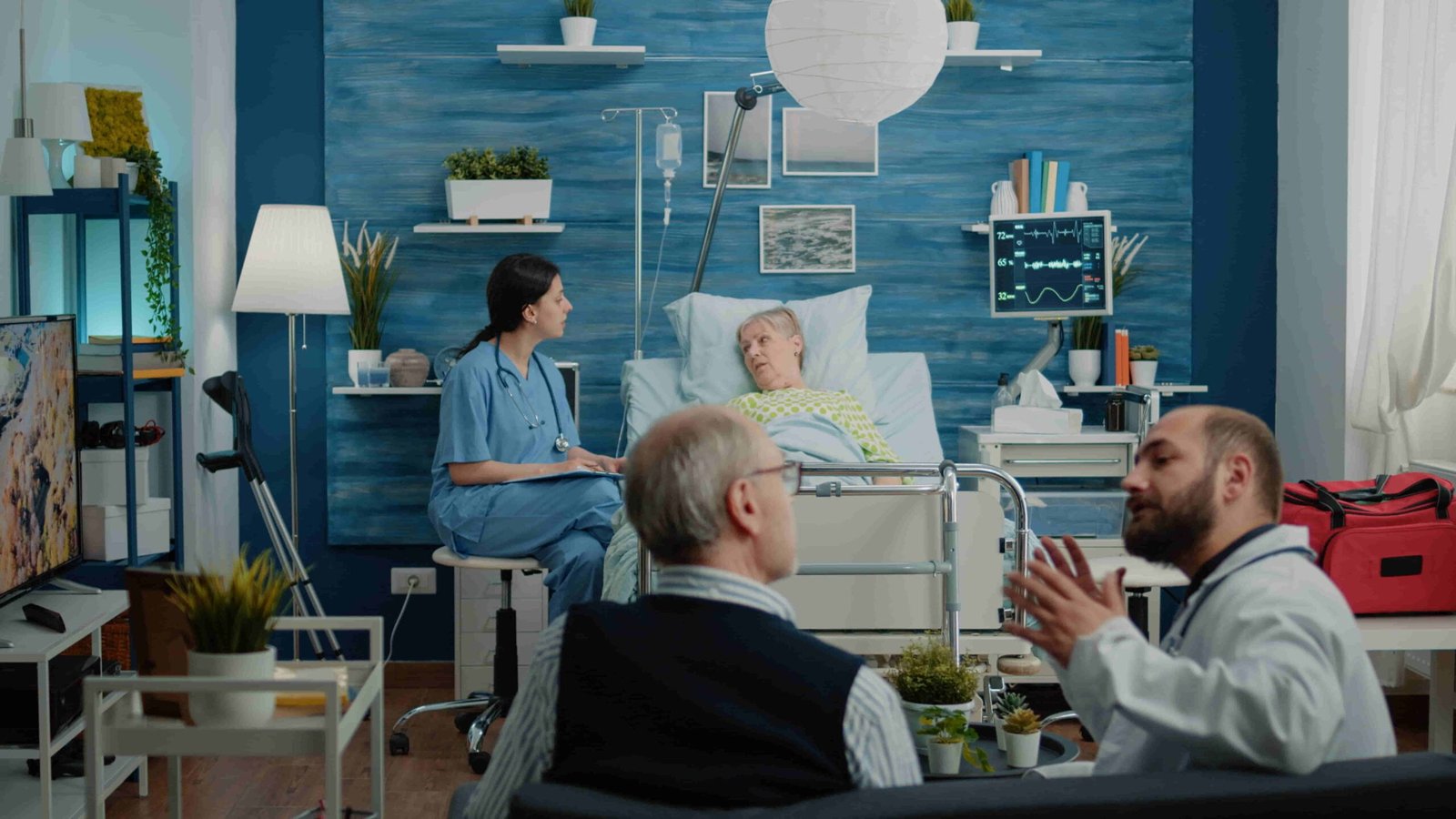SEARCH SPONSORED SCHOOLS
Not all sponsored colleges have laptop programs
FIND COLLEGES NOW!
Complete the following questionnaire and we will match you with the right schools.


Acute Care Nurse
Occupational Prestige Score: 69.46, more than average
Employment in 2023: 147,069
What do Acute Care Nurses do: Acure Care Nurses provided advanced, emergency medical care for patients suffering sudden and severe illnesses or injuries, like a stroke or heart attack. Typically working in fast-paced environments such as the emergency room or intensive care unit, where they perform life-saving interventions to stabilize patients in critical condition. More often than not, their split-second decisions are the difference between life and death.
Education Needed: Specific requirements vary by where you want to work, such as the ER or ICU. However, most acute care nurses have an Associate Degree in Nursing (ADN) or, slightly less commonly, a Bachelor of Science in Nursing (BSN). All acure care nurses are required to have their RN (Registered Nurse) or APRN (Advanced Practice Registered Nurse) license, as well as two or more years of experience in a hospital setting.
Qualities: If you feel you work best under pressure, this is a great job for you. Due to the intensity of the work they do, acute care nurses must have high stress tolerance, and be able to make quick decisions in high-stakes situations. They must also have empathy and resilience.
Salary: Median salary can be up to $86,070 yearly, or $41.38 an hour.*
Projected job growth: The Bureau of Labor Statistics predicts an increase of 6%* in employment opportunities for acute care nurses over the next 10 years. This faster-than-average expected growth is likely due to an increase in aging populations as well as significant advances in medical technology.
*Salary and employment figures are based on a national average and may vary by location.

Advanced Practice Psychiatric Nurse
Occupational Prestige Score: 69.04, more than average
Employment in 2023: 22,203
What do Advanced Practice Psychiatric Nurses do: Advanced practice psychiatric nurses, also known as mental health nurses, are Registered Nurses (RN) who assess, diagnose, and treat patients with mental health concerns ranging anywhere from mood and anxiety disorders to substance use disorder. They also provide preventative care when necessary. Advanced practice psychiatric nurses have the capability to perform therapy and prescribe medication in some states. What sets them apart from other medical professionals is that they tailors patients’ treatment plans to help each patient reach their own personal recovery goal.
Education Needed: Advanced practice psychiatric nurses must first each a Bachelor Degree in Nursing, allowing them to get their Registered Nurse (RN) license. They must either earn a Master of Science in Nursing or a Doctoral Degree, and finally pass the ANCC Psychiatric-Mental Health Nurse Practitioner (PMHNP) board certification exam.
Qualities: Because advanced practice psychiatric nurses deal with their patients’ darkest thoughts, emotional stability is a must. In order to meaningfully connect with their patients they also must be empathetic, patient, and have strong communication skills. Natural problem solvers excel at this role.
Salary: Median salary can be up to $86,070 per year or $41.38 an hour.*
Projected job growth: The Bureau of Labor Statistics predicts an increase of 9%* in employment opportunities over the next 10 years. This increase is likely the result of a growing national interest in mental health care.
*Salary and employment figures are based on a national average and may vary by location.

Registered Nurse (RN)
Occupational Prestige Score: 68.09, more than average
Employment in 2023: 3,175,390
What do Registered Nurses do? Registered Nurse is a broad term that describes healthcare professionals who have received their Registered Nurse (RN) certification. While the responsibilities of an RN vary by place of work, e.g., schools, hospitals, and clinics, in general RNs assess the symptoms of their patients and provide them care through diagnosis, medication management, medical procedures like vaccinations, and overall best practices to navigate or prevent health conditions.
Education Needed: Registered Nurses must have earned either a Bachelor of Science in Nursing (BSN) or an Associate Degree in Nursing (ADN), with the former becoming more preferable these days. RNs must also pass the NCLEX-RN bar exam.
Qualities: Because the world healthcare is unpredictable, Registered Nurses must be emotionally stable and prepared for anything. Communicating complex information to patients in a way they understand is a crucial part of the job, making strong oral communication skills imperative to the success of an RN. To be able to accurately assess and treat a wide array of conditions, RNs must be detail-oriented and have advanced critical thinking skills.
Salary: The median salary can be up to $86,070 yearly, or $41.38 an hour.*
Projected job growth: Due to a nationwide demand for healthcare services, the Bureau of Labor Statistics predicts an increase of 6%* in employment opportunities for Registered Nurses, which is a higher rate of growth than average.
*Salary and employment figures are based on a national average and may vary by location.

Critical Care Nurse
Occupational Prestige Score: 70.87, more than average
Employment in 2023: 61,298
What do Critical Care Nurses do? Critical care nurses assist doctors with providing essential medical support to patients with life-threatening conditions, by ordering tests, monitoring vital signs, and administering treatment swiftly and accurately. Critical care nurses work in the hospital intensive care unit and are often the first healthcare professional a patient will see for emergency treatment, playing a pivotal role in shifting the trajectory of a catastrophic health event. Because patients in critical condition are generally hooked up to several devices at a time, critical care nurses need to be incredibly skilled with medical equipment. This expertise sets them apart from other Registered Nurses (RNs).
Education Needed: Most critical care nurses have a Bachelor of Science in Nursing, though less commonly they may have an Associate Degree in Nursing. All critical care nurses are required to earn their Registered Nurses (RN) certification, pass the NCLEX-RN bar exam, obtain their certification in Critical Care Nursing (CCRN) and have more than 1,750 hours of direct care experience for critically ill patients.
Qualities: To navigate the high-pressure environment of the ICU while bringing their patients comfort and hope, critical care nurses must think critically, be detail-oriented, and have high stress tolerance. Active listening and compassion go a long way in giving patients peace of mind.
Salary: Median salary can be up to $86,070 per year, or $41.38 an hour.*
Projected job growth: The Bureau of Labor Statistics predicts an increase of 6%* in employment opportunities over the next 10 years. Most likely, this increase is a response to the increasing aging population in the United States.
*Salary and employment figures are based on a national average and may vary by location.

Home Health Aide
Occupational Prestige Score: 45, less than average
Employment in 2023: 512,828
What do Home Health Aides do? Under the supervision of an offsite licensed nursing staff, home health aides care for patients in their homes who are unable to care for themselves due to age, illness, or disability. Home health aides assist patients with routine healthcare, daily living and hygiene tasks, such as feeding, bathing, dressing, tending to wounds, exercise and administering medication. In an often lonely world, home health aides become companions to their patients, providing them with emotional support and dignity.
Education Needed: The Bureau of Labor statics states, most home health aides have a high school diploma or less, though other requirements, such as training programs and certifications, vary by state. Those working in certified home health or hospice agencies may need to complete formal training or pass a standardized test.
Qualities: Home health aides are sometimes required to physically assist their patients, making physical stamina a must. They must also be patient, compassionate, and have strong interpersonal skills as they provide care in the intimate setting of a patient’s own home.
Salary: Median salary can be up to $33,530 yearly, or $16.12 an hour.*
Projected job growth: The Bureau of Labor Statistics predicts an increase of 22%* in employment opportunities for home health aides over the next 10 years. This is a dramatic increase and much faster than the national average. In recent years, the United States’ aging population has begun to prefer in-home care, which is a probably explanation for this anticipated growth.
*Salary and employment figures are based on a national average and may vary by location.

Licensed Practical Nurse (LPN)
Occupational Prestige Score: 66.12, more than average
Employment in 2023: 630,250
What do Licensed Practical Nurses do? Licensed Practical Nurses (LPNs) or Licensed Vocational Nurses (LVNs) typically work in long-term care facilities such as nursing homes or clinics where they provide basic medical care to assist with patients’ recovery. The work of an LPN may include carrying out treatment plans determined by a Registered Nurse (RN) or doctor, as well as taking vital signs and assisting with daily activities. One attractive aspect of this position is that LPNs undergo less training than RNs, making this job an accessible way to get into the medical field.
Education Needed: Aspiring licensed practical nurses must complete a state-approved practical nursing program, which usually takes around 12 to 18 months. They must also pass the NCLEX-PN exam. It is common for licensed practical nurses to have completed some college, and some LPNs have earned an Associated or Bachelor’s Degree, but a college degree isn’t always necessary.
Qualities: LPNs must be compassionate, patient, have good communication skills, and pay attention to detail.
Salary: Median salary can be up to $59,730 yearly, or $28.72 an hour.*
Projected job growth: The Bureau of Labor Statistics anticipates an increase of 5%* in employment opportunities for licensed practical nurses. The faster than average growth is most likely a result of the growing trend toward outpatient care and community-based services. These are environments in which LPNs thrive.
*Salary and employment figures are based on a national average and may vary by location.

Midwife
Occupational Prestige Score: 54.23
Employment in 2023: 14,000
What do Midwives do? Midwives use natural or holistic medicina to support women during pregnancy, labor, and postpartum periods. Midwives center their treatment around the natural process of birth and prioritize the comfort of both the mother and the baby, often providing in-home care or delivering babies at birthing centers.
Education Needed: To become a midwife you must complete a direct-entry midwifery program. These are designed to provide specialized midwifery education to people from non-nursing backgrounds. Admission requirements for direct-entry midwifery programs generally include a high school diploma and coursework in the sciences. After completing such a program you may receive some sort of certificate, diploma, or associate degree in midwifery. Certified Professional Midwives generally have graduate-level education. The last step is to become certified as a midwife through the North American Registry of Midwives (NARM) exam.
Qualities: Midwives support women during their most physically and emotionally vulnerable moments. They must have incredibly strong interpersonal and decision-making skills, as well as act with empathy. The demands of the role also require physical stamina.
Salary: The median salary can be up to $129,480, or $62.25 an hour.*
Projected job growth: The Bureau of Labor Statistics anticipates an increase of 38%* in employment opportunities for midwives, much faster than the average job growth. This growth is due to increasing interest in alternative birthing options.
*Salary and employment figures are based on a national average and may vary by location.

Nurse Anesthetist
Occupational Prestige Score: 71.04, more than average
Employment in 2023: 47,810
What do Nurse Anesthetists do? Nurse anesthetists are responsible for putting patients under anesthesia and providing related care before, during, and after surgical, therapeutic, diagnostic, and obstetrical procedures. They work closely with anesthesiologists, surgeons, dentists, and other healthcare professionals.
Education Needed: Nurse anesthetists must have a Master’s Degree in Nurse Anesthesia, though it is common for nurse anesthetists to have a doctoral degree or higher. They must also pass the National Certification Examination (NCE).
Qualities: Altering one’s consciousness no doubt requires strong analytical skills and attention to detail. Nurse anesthetists must also have high stress tolerance, and be able to think critically to determine the best way to solve complex problems.
Salary: The median salary can be up to $212,650 yearly, or $102.24 an hour.*
Projected job growth: The Bureau of Labor Statistics predicts significant growth of 38%* in employment opportunities for nurse anesthetists due to the increase of procedures requiring anesthesia.
*Salary and employment figures are based on a national average and may vary by location.

Nurse Midwife
Occupational Prestige Score: 57.03, average
Employment in 2023: 6,960
What do Nurse Midwives do? Nurse midwives are similar to midwives in that they both assist pregnant women with childbirth using holistic methods, but there are three main ways they differ from one another. First, educational background: nurse midwives begin their careers as Registered Nurses (RNs) who then acquire advanced, specialized training in midwifery. Second, scope of practice: nurse midwives provide a broader array of services to women from adolescence to their menopausal years which can include primary and reproductive healthcare, not just assistance during pregnancy. Third, regulations: nurse midwives are subject to the same regulations as any other RN. Additionally, because of the advanced training nurse midwives have, they are permitted to perform a wider range of procedures and interventions, such as ultrasounds, which midwives typically cannot perform.
Education Needed: Nurse midwives must earn their Bachelor of Science in Nursing (BSN), spend at least two years working as a Registered Nurse, and then complete a graduate program in nurse-midwifery to be able to earn their Certified Nurse Midwife (CNM) certification.
Qualities: Nurse midwives must have excellent physical stamina, and be able to communicate effectively and empathetically. They must also have a supportive demeanor.
Salary: The median salary can be up to $129,650 yearly, or $62.33 an hour.*
Projected job growth: The Bureau of Labor Statistics predicts faster-than-average growth of 38%* in employment opportunities for nurse midwives in the next ten years, likely in response to the recent push from women toward personalized and holistic birthing experiences.
*Salary and employment figures are based on a national average and may vary by location.

Nurse Practitioner
Occupational Prestige Score: 68.15, more than average
Employment in 2023: 280,140
What do Nurse Practitioners do? Nurse practitioners are Advanced Practice Registered Nurses (APRNs) who provide primary care services including conducting physical examinations, diagnosing illnesses, ordering and interpreting tests, and prescribing medications. Nurse practitioners also focus on disease prevention and work with patients to find strategies to improve their health.
Education Needed: Nurse practitioners must earn either a Master of Science in Nursing (MSN) or a Doctor of Nursing Practice (DNP) degree with a specialization in a specific area of advanced practice nursing. The certification exam for this specialization will vary by type, but is generally administered by the American Nurses Credentialing Center (ANCC) or the American Academy of Nurse Practitioners Certification Board (AANPCB).
Qualities: Nurse practitioners must be confident in their decision-making and be able to tackle complex problems in order to treat underlying causes. In order to make patients feel at ease they should be compassionate and practice active listening.
Salary: The median salary can be up to $126,260 yearly, or $60.70 an hour.*
Projected job growth: The Bureau of Labor Statistics anticipates an increase of 38%* in employment opportunities for nurse practitioners. This is an incredibly high rate of growth and likely reflects a nationwide trend of Americans paying more attention to their health in order to prevent illness.
*Salary and employment figures are based on a national average and may vary by location.

Nursing Aid, Orderly, and Attendant
Occupational Prestige Score: 50.18, average
Employment in 2022: 1,406,800
What do Nursing Aid, Orderly, and/or Attendants do? Nursing aides/orderlies/attendants, hereby referred to as nursing aides, work in hospitals, long-term care facilities, and sometimes patients’ homes. They assist with patients’ daily activities such as bathing, dressing, or feeding, as well as help with mobility issues.
Education Needed: Nursing aides must have a high school diploma or equivalent, and must complete a state-approved training and certification program.
Qualities: Nursing aides are sometimes required to physically assist their patients, making physical stamina a must. They must also be patient, compassionate, and have strong interpersonal skills as they provide care to vulnerable people, sometimes in the intimate setting of a patient’s own home.
Salary: The median salary can be up to $38,130 yearly, or $18.33 an hour.*
Projected job growth: The Bureau of Labor Statistics predicts an increase of 4%* in employment opportunities for nursing aides The increase in demand for workers like these is likely due to the growing aging population in the United States.
